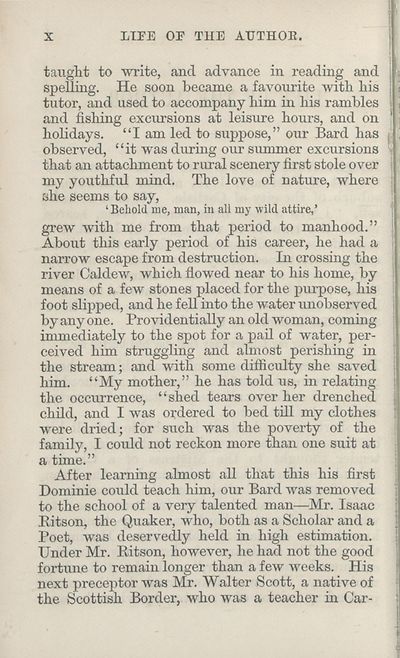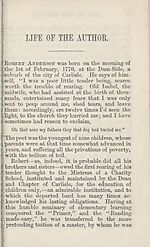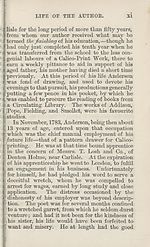Download files
Complete book:
Individual page:
Thumbnail gallery: Grid view | List view

LirE OP THE ATJTHOE.
taught to write, and advance in reading and
spelling. He soon became a favourite with his
tutor, and used to accompany him in his rambles
and fishing excursions at leisure hours, and on
holidays. “I am led to suppose,” our Bard has
observed, “it was during our summer excursions
that an attachment to rural scenery first stole over
my youthful mind. The love of nature, where
she seems to say,
‘Behold me, man, in all my wild attire,’
grew with me from that period to manhood.”
About this early period of his career, he had a
narrow escape from destruction. In crossing the
river Caldew, which flowed near to his home, by
means of a few stones placed for the purpose, his
foot slipped, and he fell into the water unobserved
by any one. Providentially an old woman, coming
immediately to the spot for a pail of water, per¬
ceived him struggling and almost perishing in
the stream; and with some difficulty she saved
him. “My mother,” he has told us, in relating
the occurrence, “shed tears over her drenched
child, and I was ordered to bed till my clothes
were dried; for such was the poverty of the
family, I could not reckon more than one suit at
a time.”
After learning almost all that this his first
Dominie could teach him, our Bard was removed
to the school of a very talented man—Mr. Isaac
Bitson, the Quaker, who, both as a Scholar and a
Poet, was deservedly held in high estimation.
Under Mr. Ritson, however, he had not the good
fortune to remain longer than a few weeks. His
next preceptor was Mr. Walter Scott, a native of
the Scottish Border, who was a teacher in Car-
taught to write, and advance in reading and
spelling. He soon became a favourite with his
tutor, and used to accompany him in his rambles
and fishing excursions at leisure hours, and on
holidays. “I am led to suppose,” our Bard has
observed, “it was during our summer excursions
that an attachment to rural scenery first stole over
my youthful mind. The love of nature, where
she seems to say,
‘Behold me, man, in all my wild attire,’
grew with me from that period to manhood.”
About this early period of his career, he had a
narrow escape from destruction. In crossing the
river Caldew, which flowed near to his home, by
means of a few stones placed for the purpose, his
foot slipped, and he fell into the water unobserved
by any one. Providentially an old woman, coming
immediately to the spot for a pail of water, per¬
ceived him struggling and almost perishing in
the stream; and with some difficulty she saved
him. “My mother,” he has told us, in relating
the occurrence, “shed tears over her drenched
child, and I was ordered to bed till my clothes
were dried; for such was the poverty of the
family, I could not reckon more than one suit at
a time.”
After learning almost all that this his first
Dominie could teach him, our Bard was removed
to the school of a very talented man—Mr. Isaac
Bitson, the Quaker, who, both as a Scholar and a
Poet, was deservedly held in high estimation.
Under Mr. Ritson, however, he had not the good
fortune to remain longer than a few weeks. His
next preceptor was Mr. Walter Scott, a native of
the Scottish Border, who was a teacher in Car-
Set display mode to:
![]() Universal Viewer |
Universal Viewer | ![]() Mirador |
Large image | Transcription
Mirador |
Large image | Transcription
| Antiquarian books of Scotland > Poetry > Ballads in the Cumberland dialect > (14) |
|---|
| Permanent URL | https://digital.nls.uk/125705383 |
|---|
| Description | Thousands of printed books from the Antiquarian Books of Scotland collection which dates from 1641 to the 1980s. The collection consists of 14,800 books which were published in Scotland or have a Scottish connection, e.g. through the author, printer or owner. Subjects covered include sport, education, diseases, adventure, occupations, Jacobites, politics and religion. Among the 29 languages represented are English, Gaelic, Italian, French, Russian and Swedish. |
|---|

